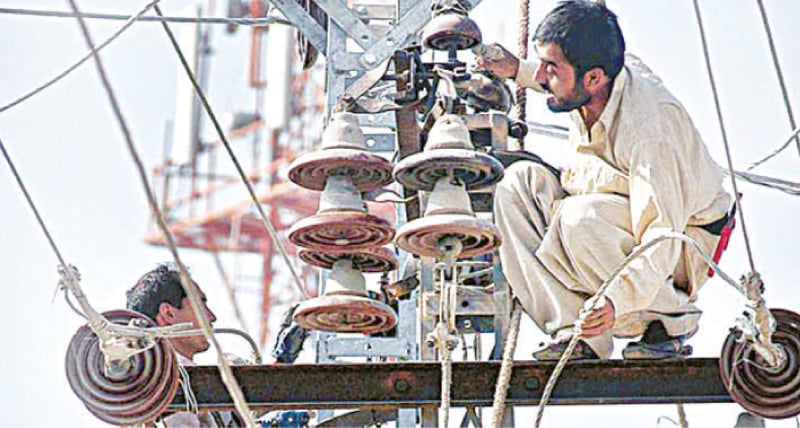
ISLAMABAD: The National Electric Power Regulatory Authority (Nepra) on Tuesday acknowledged that the circular debt has crossed Rs2 trillion mark with an increase of more than 30 per cent in the last fiscal year.
In its ‘State of the Industry Report 2020’, the power regulator said that the circular debt has reached Rs2.15tr by June this year from Rs1.6tr in June 2019.
The report said that Covid-19-related issues have also contributed to the rise in circular debt as the pandemic has led to an increase in theft of electricity and non-payment of electricity bills.
Read: The ticking time bomb of circular debt
The Covid-19 lockdowns added to reduction of recoveries of distribution companies (Discos). The combined recovery of all power Discos remained at 88.77pc in the FY20 compared to 90.25pc in FY19, showing an overall decrease of 1.48pc in recoveries during the year.
The report said that receivables from public and private consumers as well as delayed payments of subsidies are causing increase in circular debt.
Nepra said that one of the main causes of theft of electricity and non-payment of electricity bill is higher electricity tariff.
This load-shedding policy is causing decrease in sale of electricity from the available ‘take or pay’ power plants and thus causing higher per unit cost of electricity. Discos, therefore, need to improve governance and disconnect individual consumers who are either defaulters or involved in electricity theft, rather than observe load-shedding on feeder having high transmission and distribution losses and low recovery, the regulator said.
Showing serious reservation over the high tariff of the electricity, Nepra has noted that the high cost of electricity, inefficient distribution services and load-shedding policy on high loss feeders is pushing consumers away from Discos.
On power generation, the report said that the installed power generation capacity of the country as on June 30 was at 38,719MW, compared to 38,995MW on June 30, 2019 showing a net decrease of 276MW. Meanwhile, during the year, transmission and distribution losses of Tribal Areas, Quetta and Peshawar electricity supply companies increased in comparison with the last year. Meanwhile, the losses at the Islamabad, Gujranwala, Lahore, Faisalabad, Multan, Hyderabad and Sukkur electric supply companies decreased in comparison with FY19.
The load-shedding policy is compelling consumers for use of smaller inefficient gas or diesel generators as well as un-interrupted power supply (UPS) systems, which has disrupted the efficient allocation of valuable resources in the economy.
The high-cost of electricity, inefficient distribution services and load-shedding policy on high-loss feeders is pushing consumers away from Discos, the report noted.
The distributed generation through solar power solutions has made a significant ingress in the domestic consumer base of Discos which are losing consumers with high consumption and paying capacity. Similarly, commercial, educational and industrial outfits are also inclined to drift away from Discos and opt for self-generation through solar power.
So far, nearly 5,000 net-metering licences with around 86MW electric power generation capacity have been issued by Nepra. Apart from the distributed generation, various industrial and commercial consumers of Discos, dissatisfied with the higher cost and poor quality of services, tend to directly purchase electricity from generation companies for reliable and cheaper electricity supply through wheeling arrangements.
The power sector reforms envisaged a transition from monopoly structure to a competitive market; an objective which has not been achieved yet. Discos, which were supposed to be independent commercial entities, are instead tied centrally, having the least say in their own commercial decisions.
Similarly, the public sector generation companies (Gencos) have also been centrally tied by the creation of Genco Holding Company Ltd. Any attempt to further protect the monopolistic and oligopolistic status quo may not only hurt the power sector but also the overall economic growth of the country, the report warned.
The report also noted that gas allocation and its supply to the power plants is not well coordinated between the relevant entities. At various occasions, gas was being supplied to less efficient power plants while under-utilising or non-utilising efficient power plants due to non-availability of gas. Further, the operation of steam turbine power plant of Gencos and K-Electric using pipeline quality gas is inefficient.
Similarly, the use of gas for power generation by captive power plants, having much lower efficiencies as compared to the efficient gas based power plants available in Central Power Purchasing Agency and KE systems is also in-efficient burning of gas.
The report further noted that despite availability of sufficient generation capacity to meet the demand, Discos have adopted a policy of loadshedding on feeder level. Resultantly, despite having surplus power generation capacity, long hours of loadshedding still persist in several areas of Discos. This policy of load-shedding on feeder level at the pretext of high losses and low recovery is penalising law-abiding consumers.
The report said that the National Transmission and Dispatch Company showed 35pc and KE shows 20pc reduction in forced outages on entire transmission network.
Published in Dawn, October 21st, 2020













































